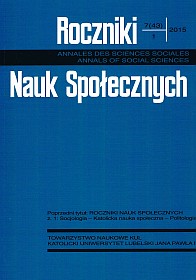How Shale Gas Revolution and LNG Technology Will Change the Geopolitical Attractiveness of Post-Soviet Central Asia
Abstract
Analyses of post-Soviet Central Asia are mostly of geopolitical character. Predominantly they concern region's role in context of Western military presence in Afghanistan or its economic attractiveness in context of Caspian natural gas and crude oil reserves. However, the ongoing scientific debates, while concentrated on short-term developments in the post-Soviet space, often do not acknowledge the consequences of international shale gas revolution and LNG technology proliferation for the region. Technological advancement in terms of natural gas extraction, transport and distribution may decrease region’s attractiveness for the Western actors and make the New Great Game in Central Asia a domain of exclusively authoritarian players.
References
Axyonova V., EU Human Rights and Democratization Assistance to Central Asia: In Need of Further Reform, “EUCAM Policy Brief”, nr 22, styczeń 2012 (27.01.2012).
Boonstra J., Democracy in Central Asia: Sowing in Unfertile Fields?, “EUCAM Policy Brief”, nr 23, maj 2012 (16.05.2012).
Boonstra J., EU Central Asia Policy: Steady as She Goes, “Central Asia Policy Brief”, nr4, sierpień 2012.
Boonstra J., Is the EU Downscaling Political Engagement in Central Asia?, “EUCAM Commentary”, nr 23, luty 2014 (27.02.2014).
Collins K., Clan Politics and Regime Transition in Central Asia, Cambridge–New York, NY: Cambridge University Press 2006.
Cooley A., Great Games, Local Rules, Oxford: Oxford University Press 2012.
Gavrilis G., Central Asia's Border Woes & the Impact of International Assistance, Central Eurasia Project, Open Society Foundation, maj 2012, http://www.opensocietyfoundations.org/sites/default/files/OPS-No-6-20120601.pdf (dostęp: 01.09.2014).
Kozłowski K., Iluzje rewolucji. Rewolucja róż, rewolucja pomarańczowa, rewolucja tulipanów, Warszawa: Oficyna Wydawnicza SGH 2010.
Kozłowski K., Państwo Środka a Nowy Jedwabny Szlak. Poradziecka Azja Centralna iXinjiang w polityce ChRL, Toruń: Wydawnictwo ADAM MARSZAŁEK 2011.
Melvin N., The EU Needs a New Value-Based Realism for its Central Asia Strategy, „EUCAM Policy Brief”, nr 28, październik 2012 (31.10.2012).
Rashid A., The New Great Game – The Battle for Central Asia's Oil, „Far Eastern Economic Review”, 10 kwietnia 1997 r.
Rashid A., Dżihad. Narodziny wojującego islamu w Azji Środkowej, tłum. A. i M. Falkowscy, Warszawa: Wydawnictwo Akademickie DIALOG 2003.
Stępniewski T. (red.), The New Great Game in Central Asia, Lublin: Wydawnictwo KUL 2012.
Copyright (c) 2015 Roczniki Nauk Społecznych

This work is licensed under a Creative Commons Attribution-NonCommercial-NoDerivatives 4.0 International License.


